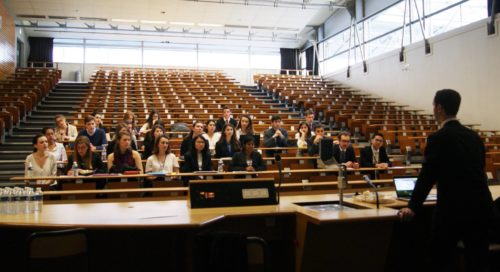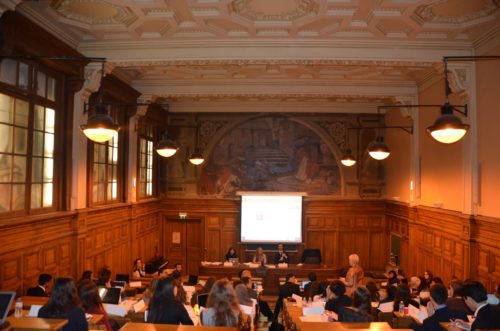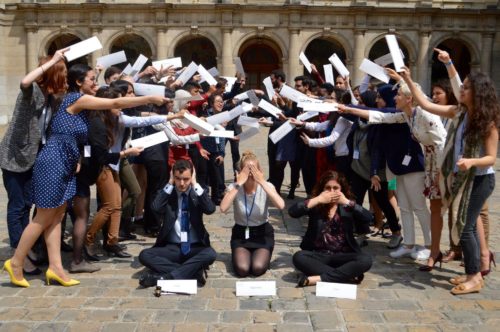It’s February! Here at Best Delegate, we understand that the learning curve of Model U.N. can be overwhelming, but that shouldn’t deter you. That’s why we are embracing this month’s theme – How to Train New Delegates!
Chairing for Beginners – Part 1 – Introduction to Chairing
This is an introductory article for a series of articles on chairing for beginners. What is the purpose of chairing? What makes a good chair and how can you improve as a chair?

Chairing demonstrates a capability to hold a room of delegates together for the purpose of making solutions for the world’s most difficult international issues.
Introduction to chairing
The Oxford Dictionary defines a chair as a person who is in charge of a meeting or an organization. While this definition gives a general gist of what it is like to chair at a Model UN conference, chairing can elevate a monotonous debate to a fun, entertaining and all-encompassing activity.
This article will aim to go through all of the essential aspects of chairing at Model UN conferences, what are the basics, the requirements, what makes a good chair an excellent one, and why it is what good chairs are so important to conferences of all sizes.
The Basics
Chairs for university level MUN have 3 basic activities: write the study guide for their allocated committee, be knowledgeable of the rules of procedure for the conference and to principally manage the speaking time and order throughout the duration of the conference. Within these requirements lie the purpose of chairing. In Model UN, chairs are not supposed to have any bias towards any institution and principally act as a judge for deciding which delegates deserve their awards.
The Requirements
While winning awards is often seen as a requirement for many delegates, in reality, this is not necessary at all. The qualities of a good chair are different to those expected from an award-winning delegate, even if they do overlap at times.
While an award winning delegate is expected in most instances to have spoken regularly during the committee, written documents and generally acted diplomatically; a chair is detached from all of these aspects. Speaking publically is naturally essential and so is the knowledge on how to write draft resolutions, but on top of this, chairs must have a profound knowledge on the topics that they will be discussing in their committees to avoid a stale debate.

UNESCO Committee at PIMUN 2016
What makes an excellent chair?
Just like it takes time to learn how to become a consistent, award-winning delegate at MUNs, learning to become an excellent chair takes time and practice. Particularly, chairing at top level conferences worldwide serve as the true learning ground. But what qualities separate a good chair to an excellent one?
Firstly, making sure that every delegate is aware of what is going on in the committee. This might seem like an obvious point, but not all chairs repeat exactly what it is that the committee is going to be voting on. Think if you were sitting in committee and you are voting on your 13th moderated caucus of the day, would you be aware of what the topic is? Or what the total time of the caucus is? Most likely you won’t be. Clearly restating what exactly is going on is essential to good chairing.
Similarly, an excellent knowledge of the rules of procedure is absolutely necessary. This applies to each conference that a chair will be chairing at. Reading through the rules of procedure of each conference is essential so that you can know the nuances of the rules. You want to be certain that you also do not accept rules that are not in the rules of procedure. I’ve personally had instances of delegates raising motions which are not in the rules of procedure and telling me “Yes they are in the rules of procedure”. If a motion is not in the rules of procedure, you as a chair are bound to abide by it. The rules were written in a certain way for a purpose, going against the rules is not your job as a chair. An excellent chair will abide by the letter of the law. For MUN, the letter of the law is the rules of procedure, nothing more, nothing less.
Keeping a fun atmosphere within the committee is also essential. I’ve had chairs who are absolutely terrifying. What is important to realize is that both chairs and delegates are students with more or less experience doing MUN. In this regard, keeping in mind that MUN is a simulation of the actual debates in the UN is important, so having funny awards, gossip boxes and also showing delegates funny cat videos from time to time can really do wonders in keeping the atmosphere cheerful.
Why are good chairs so important?
Good chairs are in my eyes, the fundamental human aspect which determines whether a delegate will enjoy themselves at a Model UN conference or not. As a secretariat member, you can have the best socials and the best guest speaker at the opening ceremony, but if your chairs don’t know the rules of procedure, are biased towards certain delegates and do not recognize those who haven’t spoken, then that delegate will not enjoy the conference and will not remember it fondly.

Taking the time to have a bit of fun in your committee is almost always appreciated by the delegates.
In the next article, we will explore the varying methods of chairing and the variety of software that is used for MUN.

